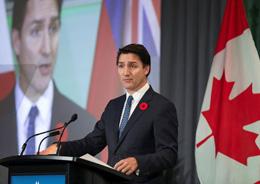Carbon tax hike will hurt future generations

Guest Commentary
By Kenneth P. Green
Despite calls from seven of Canada’s premiers (including one premier from his own party) to scrap the upcoming carbon tax hike, Prime Minister Justin Trudeau has doubled down as he tries to convince Canadians that somehow this tax, which is set to rise from $65 per tonne of greenhouse gas emissions (GHG) to $80/tonne on April 1, will really be good for them.
Speaking with reporters in Calgary, the prime minister said, “My job is not to be popular,” adding “My job is to do the right things for Canada now and do the right things for Canadians a generation from now” to “deliver that better future one generation from now, two generations from now.”
But Trudeau’s argument that somehow GHG reductions, which might stem from Canada’s carbon tax, will yield appreciable benefits of any kind—economic or environmental—now or in future is nonsense.
Why?
Because Canada’s share of global GHG emissions is slowly declining and small relative to the world’s larger emitters particularly China. Indeed, in 2021 Canada's emissions comprised 1.5 percent of global GHG emissions compared to 26 percent for China (in 2018). And since 2005, emissions from China increased by a staggering 71.7 percent. It’s absurd to think that, even if Canada could drive its GHG emissions to zero, there would be no measurable impact on the global climate. And no impact on climate means no improved environmental benefits for future generations.
Economically, the prime minister’s argument is even less compelling than the proclaimed environmental benefit. According to a study published by the Fraser Institute, implementing a $170 carbon tax would shrink Canada’s economy by 1.8 percent and produce significant job losses and reduce real income in every province.
The cadre of Trudeau government policies, including the carbon tax and imposition of federal bills C-48 (which bans large oil tankers carrying crude oil off British Columbia’s north coast, limiting access to Asian markets) and C-69 (which introduces subjective criteria including the “social impact” of energy investment into the evaluation process of major energy projects), combined with impending regulations such as GHG emission caps, are contributing to a collapse in business investment and ultimately economic stagnation in Canada.
Per-person gross domestic product (GDP)—a broad measure of living standards—has barely budged in the last nine years and in fact stood in 2014 at $58,162, which is $51 higher than at the end of 2023 (inflation-adjusted). In other words, living standards for Canadians have declined.
Capital investment, which contributes to economic growth and higher living standards, is also declining. A 2021 Fraser Institute study showed that the growth rate of overall capital expenditures in Canada slowed substantially from 2005 to 2019, and the growth rate from 2015 to 2019 was lower than in virtually any other period since 1970. Moreover, as recently as 2000 to 2010, overall capital investment in Canada enjoyed a substantially higher growth rate than in other developed countries, but from 2010 to 2019, Canada’s investment growth rate dropped substantially below that of the United States and many other developed countries. Corporate investment in Canada as a share of total investment was also the lowest among a set of developed countries from 2005 to 2019.
Far from delivering environmental or economic benefits for Canadians “one generation from now” or “two generations from now,” Prime Minister Trudeau’s policies have thrown serious shadows over the future economic prospects of Canadians who will find themselves less well-off and less economically capable of adapting to predicted climate risks whether manmade or natural.
Kenneth P. Green is a Senior Fellow at the Fraser Institute.






